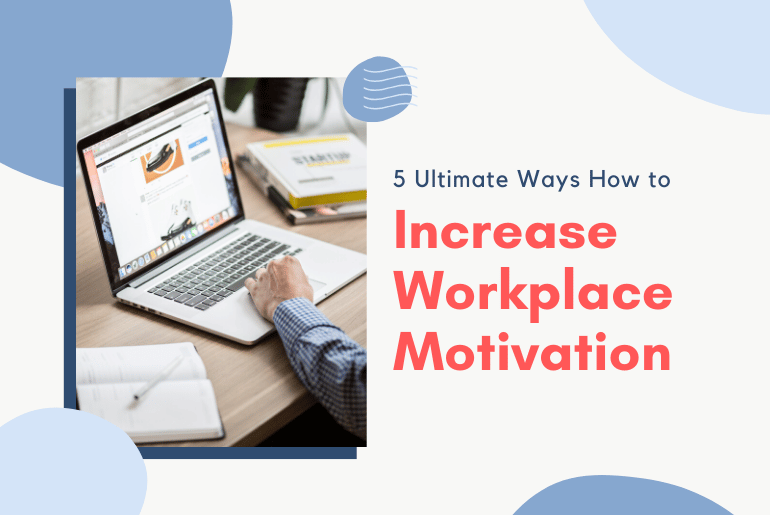Workplace motivation is important. The average person spends one-third of their lifetime working, and so, you want to make sure you choose a career that you’re passionate about and are motivated with.
I bet nobody wants to spend one-third of their life doing work that they hate, right? This is why workplace motivation is important.
Plus, when you are feeling motivated to go to work, you can accomplish more, feel more fulfilled, and be truly satisfied with your contribution to your company, business, and community.
Don’t get me wrong, I’m not saying that your life is all about working and building a successful career, but if you want to live a fulfilling life, you can’t do it without having an exciting career.
This is why workplace motivation is important. You don’t want to wake up feeling no motivation and have to force yourself to go to work.
The good news is that you can build workplace motivation. You can manufacture your feelings so that when you get into your office, you feel driven to take action and work on your projects.
So, how do you create an encouraging work environment that supports and motivates you? Here are some tips…
1. Create The Trigger
If you are someone who always procrastinates and always feel no motivation to work, this will be a great tactic to overcome your problem.
Find out what trigger your motivation. Do you know that everyone’s hot button is different?
Some people procrastinate when they see their couch, they want to lie and sleep on it. The couch is their trigger for procrastination.
Some people feel motivated instantly when they see the sales charts hanging on the wall in their office.
Some people are driven whenever they think about their kids because they want to provide a better shelter and life to the people they loved most.
So, what triggers you to feel motivated? What pumps you up?
For most people, when they think about their dreams and what they want to accomplish in the future, they feel motivated and they want to take action.
The thoughts act as the trigger.
This is why I suggest you consciously think about your goals and your dreams. It is what successful people do and it is what separates the extraordinary from the ordinary.
Well, what triggers you? What makes you feel motivated and make you want to take action?
You can create the trigger so that whenever you step into your workplace, you feel motivated and productive instantly.
Find out your trigger and incorporate it into your workplace. Make your workplace encouraging so that you feel driven every time you get to work.
2. Create the Accountability Factor
Imagine you want to hit the gym, but you don’t feel motivated to exercise. But you have promised a good friend to do it together with him. So, are you going to just hit the gym or are you going to break your promise?
The answer is clear. This is the result of having accountability.
When you are accountable for your work/task/project, you become more committed to getting it done.
People lack motivation because they lack accountability.
Think about it, why do most people keep their goals to themselves? Well, it is because they don’t want to feel embarrassed by telling people about their dreams and goals, but end up not achieving them.
Another reason people don’t want to share their goals and dreams is because they don’t dare to make a full commitment.
They don’t want to take full responsibility for what they have said or planned to achieve in their lives. This is why most people are afraid to publicly announce their goals and dreams.
According to a study conducted by Dr. Gail Matthews from Dominican University, she discovered that people who wrote down their goals and sent a weekly progress report to an accountability partner, experienced a 76% increased in successfully achieving the goal.
So, what are you waiting for? If you want to feel motivated and driven in your workplace, get an accountability partner.
Here’s how Leo Babauta, the guy behind the ZenHabits blog creates his motivation and accountability:
When I wanted to run my first marathon, I started writing a column about it in my local daily newspaper. The entire island of Guam (pop. 160K) knew about my goal. I couldn’t back down, and even though my motivation came and went, I stuck with it and completed it. Now, you don’t have to commit to your goal in your daily newspaper, but you can do it with friends and family and co-workers, and you can do it on your blog if you have one. And hold yourself accountable — don’t just commit once, but commit to giving progress updates to everyone every week or so.
Leo Babauta used public commitment to creating accountability and commitment, what about you?
When you know someone is watching your progress, you become more committed and driven to get the work done.
3. Apply the Gamification Factor
Have you heard of the phrase, “gamification”? It simply means that you make your work like playing a game.
You see, we all love to play games. People go all out and play their best to win. This is how sports work. When the competition is on, people become committed, and are motivated to win.
You can apply the same principle to your workplace. Make your work fun and exciting by introducing the gamification factor into it.
Here’s a classic example. Do you know why most sales companies share their weekly or monthly sales report with their staff?
It is because they want to drive their salespeople through competition. When you see John is doing better than you and you’re just one sale behind him, it motivates you to pursue the sale and do better than John.
Competition improves motivation.
Incentives like bonus and overseas trip can be a great reward for the games.
Therefore, make your workplace fun. You can motivate yourself by gamifying your work.
In my case, if I’m able to finish all my tasks on time, I allow myself an hour of game time. It works like a reward system. You just need to make the work fun and build the competition for your team.
Here’s a good article you should check out from Entrepreneur.com:
Gamify Your Life and Become Massively Successful
4. Build the Habit
Motivation is what gets you started, habit is what gets you going.
You cannot depend on motivation all the time. Motivation is needed when you first started, but as time goes by, you need to build productive habits to keep things going.
If you rely on motivation alone, what do you think will happen when you don’t feel motivated? That’s right, you will procrastinate and put things off. You feel tired and you don’t feel like doing anything.
So motivation is good to kick start your day, the rest, you should make it into your habits.
The idea of creating a productive habit may not sound fancy, but it is extremely important if you want to live a successful life.
Your habits will determine your destiny. Here’s my favorite quote:
We are what we repeatedly do, excellence then, is not an act, but a habit.
Aristotle
Think about it, how much motivation do you need when it comes to brushing your teeth every morning?
Well, most people brush their teeth automatically without even thinking about how to do it. It has become their habit that they brush their teeth unconsciously.
When an act becomes your habit, you will do it unconsciously, without much effort. The same goes for driving. You don’t have to think much about how to turn the steering or pressing the pedal, you just drive, through habits.
This is why it is important to develop productive habits that will get you going.
The question now becomes how can you develop good habits?
Here is an easy and simple way how you can do it. It is called habit stacking.
Basically, habit stacking suggested that we incorporate our new habits before or after a trigger or old habit.
For example:
- Reading habit: Before I eat my breakfast, I will spend 15 minutes reading.
- Goal setting habit: After I brush my teeth, I will write down my top 10 goals.
- Exercise habit: Before I take a shower in the morning, I will do 20 pushups.
- Writing habit: After I eat my breakfast, I will spend an hour writing an article.
- Start-work habit: Before I check emails, I will work on my most important task of the day.
- Planning habit: Before I sleep each night, I will write down the top 5 tasks I need to accomplish the next day.
It is simple, just insert a new habit before/after an old habit.
This habit stacking tactic is powerful because you are leveraging on your old habits to insert a new habit into the cycle.
Whenever you perform the old habit, it triggers you to do the new habit.
What new habit do you want to build? Do you want to read for 30 minutes a day? Do you want to do 30 pushups or jogging for an hour? Do you want to write 1,000 words each day?
Use the habit stacking to develop your new habit for your workplace.
When you have developed the right habits, you will get to work automatically. You don’t really need that much motivation.
Thus, turn your work behaviors into habits so that every time when you arrive in your workplace, you will feel motivated automatically.
5. Find the Meaning
If you want to feel motivated and passionate about your work, you need to understand the real meaning of your work.
Why do you work in the first place? Why do you do what you do?
In one of my previous articles, I shared a study conducted by Adam Grant, the author of the best-selling book, Give and Take…
In his best-selling book, Give and Take, Adam Grant conducted a study about a fund-raising activity for scholarships in a university.
Grant divided the participants into 3 groups and discovered that the participants who are required to read stories from scholarship recipients about how the scholarships have changed their lives, tend to work harder with improved performance.
The participants saw a 155% increase in the weekly pledges and successfully raised 143% more fund for scholarships.
Not only that, Grant also found that swimming pool lifeguards who read stories about saving drowning swimmers before they started their job were 21% more active at their job.
In other words, when you are working toward an impactful cause, you are more likely to work harder and stick to your plan rather than feeling lazy to act on your goals.
When you are working for a bigger purpose and impacting people’s lives, you tend to become more motivated to do the work.
Hence, you need to think beyond just getting paid your salary every month. If you work because you want to get paid, then it is difficult to feel motivated with your work.
After all, what you seek is monetary compensation. And regardless of whether you are doing a good job or a bad one, you will still get paid.
This is why I encourage you to think bigger. Find the meaning in your work. How does your work impact and change lives?
When John F. Kennedy asked the janitor who was sweeping the floor in NASA, the janitor replied he was helping to put a man on the moon. The janitor looked at his job as an important mission for his country, not as a mere cleaner.
If you are a blogger, don’t look at your work as just someone who publishes content on the internet just to make money. Instead, look at your job as inspiring others and sharing insightful content to help people live a better life.
That’s how I look at my work as a blogger. I don’t look at myself as a writer who puts up words on the internet so that I will get more traffic.
I look at myself as someone who is passionate about the topics that I shared. I look at myself as someone who inspires others to achieve their goals, reach their dreams, and help them to accomplish greater success in life.
When I think about this, I’m totally pumped up. Because I want to help.
Conclusion
These are the 5 ultimate ways how you can increase your motivation at work.
First, you have to figure out what motivates you, and then use the trigger to make yourself driven.
Next, you want to have an accountability partner to keep an eye on your work. When you feel accountable, you will become more committed and less likely to procrastinate.
Try to introduce the gamification factor to your work. Make it fun that you will be looking forward to work and hit your office each morning.
Turn your work into habits. When you developed productive habits, you don’t need that much motivation to work.
Finally, find the meaning of your work. How your work can improve the world and impact other people? The more meaningful your work, the more driven you will be.
Do you find these tips helpful? Let me know in the comment section below.



Good article, Shawn. Thank you for sharing.
The “habit stacking” thing you talk about is similar to the concept of Tiny Habits, developed by Stanford University professor B.J. Fogg. Have you heard of it?
Hi Rich, yea, I have heard about B.J. Fogg, but I have not read anything about Tiny Habits. 🙂
[…] Build up your productivity on a strong base of sound sleep that strengthens your body from within. […]
[…] you’ll avoid wasting time searching for misplaced items. If you’re working remotely, having an organized workspace can help create a clear boundary between work and home life. Implementing a few organizational […]